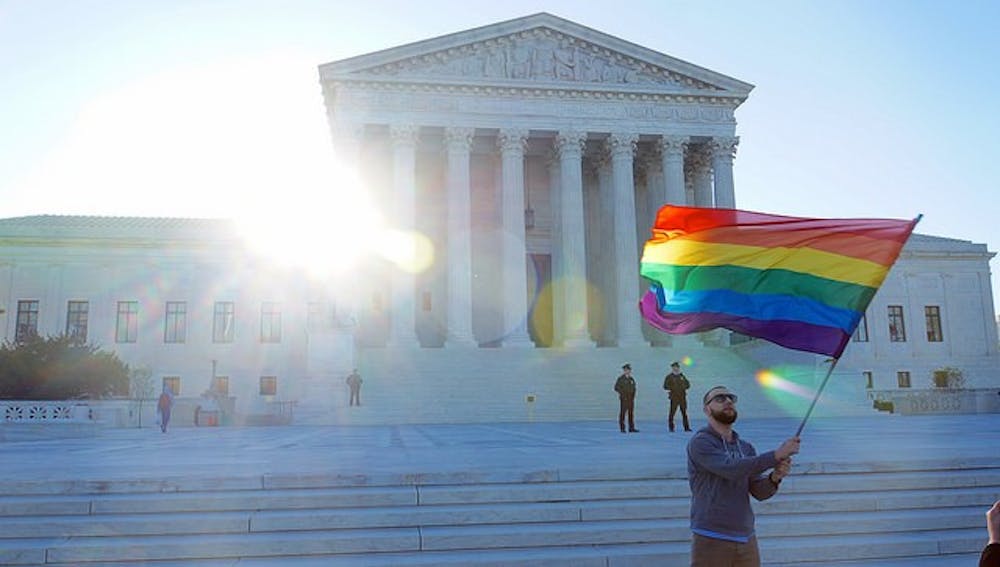Kayla DeLucia called the moment she learned that same-sex marriage was legal throughout the United States one of those “rare moments you will never forget.”
DeLucia, a sophomore occupational therapy major and treasurer of UB’s Lesbian Gay Bisexual Transgender Alliance (LGBTA), said when the Supreme Court’s ruling on Obergefell v. Hodges was announced on CNN, the feeling she had was “indescribable.”
The United States Supreme Court ruled in a 5-to-4 vote that, under the Fourteenth Amendment, all states must grant same-sex marriages as well as recognize same-sex marriages performed in other states on June 26. This ruling occurred on the two-year anniversary of the United States v. Windsor case, which found the Defense of Marriage Act unconstitutional due to the Due Process Clause of the Fifth Amendment.
Rachael Hinkle, an assistant professor in UB’s Department of Political Science, said that under the Due Process Clause – which asserts that all states are legally required to respect all legal rights owed to a person – the Court found that it was unconstitutional for states to deny marriage to same-sex couples.
“By determining that marriage is a fundamental right, and not just meaning between one man and one woman, but between any two people, they found that it violated Due Process to restrict people’s fundamental right to get married,” Hinkle said.
David Scarfino, UB’s LGBTA president and a sophomore occupational therapy major, said that he was shocked by the outcome because he didn’t believe marriage equality would come so soon to the United States.
“To be honest, I didn’t think marriage equality would be a thing in this decade,” Scarfino said. “Maybe it was the doubt I had that made me think that way, but even with all the supporters, there are still people with harsh views that really discourage your way of thinking.”
However, even with all of those people who Scarfino said had negative views toward marriage equality, he said that the outpour of support he saw on social media by friends and even celebrities after the ruling was announced this past Friday made it “that much sweeter.”
Like Scarfino, DeLucia said that she has seen a lot of support on social media and noted how many of her friends have changed their Facebook profile pictures to have a rainbow effect over it – an option the social media platform is offering to celebrate the Supreme Court’s ruling. DeLucia said that the support coming from several popular companies, such as Facebook, has been great.
“A majority of the media outlets have been showing it in a positive light and there has been more and more companies coming out and supporting the decision as well,” said DeLucia. “Although I think it would have been more beneficial for these companies to show their support sooner, it’s nice to see.”
Hinkle said that the Supreme Court made its decision based on the Due Process Clause has a greater importance than if it had made the ruling based off the Equal Protection Clause. The Due Process Clause makes the ruling stricter.
“The importance of that is had they ruled these laws were unconstitutional under the basis of equal protection, that kind of ruling would have had a broader implication,” she said. “It would have meant that gays and lesbians, any sexual minority, are entitled to equal protection of the law and states can’t draft laws in order to treat them differently.”
Hinkle said that the ruling is actually much narrower than it could have been and can be brought up in other cases in the future for discrimination of sexual minorities, such as employment and housing discrimination.
DeLucia says that she believes that marriage equality is a huge step for the LGBTQ community and she is hopeful that it will lead to more awareness to certain sexual minorities such as bisexual and asexual individuals.
Scarfino said he is optimistic that because so many people cared about marriage equality, this means that there will be more support for other issues in the LGBTQ community, such as transgender rights. Scarfino also said that while marriage equality is a huge achievement, it’s just the start.
“The struggles don’t end with marriage equality being reality,” Scarfino said. “In fact, there’s much more to accomplish as a community and as a nation.”
Marlee Tuskes is the assistant news editor and can be reached at marlee.tuskes@ubspectrum.com





